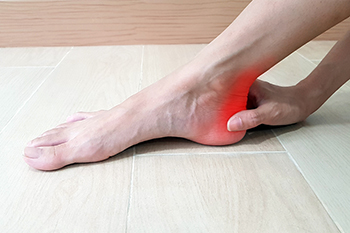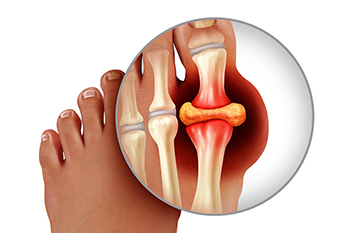Items filtered by date: December 2024
Various Types of Heel Pain

Heel pain is a common issue that can significantly impact daily activities. The most frequent causes include plantar fasciitis, Achilles tendonitis, Sever’s disease, and bursitis. Plantar fasciitis is an inflammation of the tissue that runs along the bottom of the foot, causing sharp pain, especially with the first few steps in the morning. Achilles tendonitis occurs when the Achilles tendon becomes inflamed, leading to pain at the back of the heel. Sever’s disease, common in growing children, is an inflammation of the growth plate in the heel. Bursitis occurs when the small fluid-filled sacs in the heel become inflamed, causing discomfort. The causes of heel pain can vary, from overuse and wearing poor footwear to biomechanical issues. A podiatrist can diagnose the root cause and recommend effective treatments, such as custom orthotics, stretching exercises, or even surgery, if needed. If you have heel pain, it is suggested that you schedule an appointment with a podiatrist to find relief.
Many people suffer from bouts of heel pain. For more information, contact Edward Sharrer, DPM of Premier Foot and Ankle Clinic. Our podiatrist can provide the care you need to keep you pain-free and on your feet.
Causes of Heel Pain
Heel pain is often associated with plantar fasciitis. The plantar fascia is a band of tissues that extends along the bottom of the foot. A rip or tear in this ligament can cause inflammation of the tissue.
Achilles tendonitis is another cause of heel pain. Inflammation of the Achilles tendon will cause pain from fractures and muscle tearing. Lack of flexibility is also another symptom.
Heel spurs are another cause of pain. When the tissues of the plantar fascia undergo a great deal of stress, it can lead to ligament separation from the heel bone, causing heel spurs.
Why Might Heel Pain Occur?
- Wearing ill-fitting shoes
- Wearing non-supportive shoes
- Weight change
- Excessive running
Treatments
Heel pain should be treated as soon as possible for immediate results. Keeping your feet in a stress-free environment will help. If you suffer from Achilles tendonitis or plantar fasciitis, applying ice will reduce the swelling. Stretching before an exercise like running will help the muscles. Using all these tips will help make heel pain a condition of the past.
If you have any questions please contact our office located in North Little Rock, AZ . We offer the newest diagnostic and treatment technologies for all your foot and ankle needs.
Heel Pain in the Morning?
Proper Use of a Cane Can Prevent Falling

Conditions such as balance issues, ankle instability, or pain from injuries can make walking challenging, increasing the risk of falls. Using a cane can help provide stability and reduce pressure on the affected area. When using a cane, the most effective approach is to hold it in the hand opposite the injured foot, allowing the cane and the affected leg to work together for better support. For example, if the right ankle is in pain, holding the cane in the left hand and stepping forward with both the left hand and the right foot simultaneously creates a more balanced and natural gait. This method minimizes strain on the affected foot and helps prevent altered walking mechanics that could lead to back or hip discomfort. A podiatrist can provide guidance on proper cane usage and evaluate underlying foot or ankle conditions to address pain and improve mobility. If you have fallen and have injured your feet, it is suggested that you schedule an appointment with a podiatrist.
Preventing falls among the elderly is very important. If you are older and have fallen or fear that you are prone to falling, consult with Edward Sharrer, DPM from Premier Foot and Ankle Clinic. Our podiatrist will assess your condition and provide you with quality advice and care.
Every 11 seconds, an elderly American is being treated in an emergency room for a fall related injury. Falls are the leading cause of head and hip injuries for those 65 and older. Due to decreases in strength, balance, senses, and lack of awareness, elderly persons are very susceptible to falling. Thankfully, there are a number of things older persons can do to prevent falls.
How to Prevent Falls
Some effective methods that older persons can do to prevent falls include:
- Enrolling in strength and balance exercise program to increase balance and strength
- Periodically having your sight and hearing checked
- Discuss any medications you have with a doctor to see if it increases the risk of falling
- Clearing the house of falling hazards and installing devices like grab bars and railings
- Utilizing a walker or cane
- Wearing shoes that provide good support and cushioning
- Talking to family members about falling and increasing awareness
Falling can be a traumatic and embarrassing experience for elderly persons; this can make them less willing to leave the house, and less willing to talk to someone about their fears of falling. Doing such things, however, will increase the likelihood of tripping or losing one’s balance. Knowing the causes of falling and how to prevent them is the best way to mitigate the risk of serious injury.
If you have any questions, please feel free to contact our office located in North Little Rock, AZ . We offer the newest diagnostic and treatment technologies for all your foot care needs.
Understanding Achilles Tendonitis

Achilles tendonitis is an injury that affects the Achilles tendon, the large tendon located at the back of the ankle, connecting the calf muscles to the heel bone. This condition occurs when the tendon becomes irritated or inflamed due to overuse or excessive strain. Common symptoms of Achilles tendonitis include pain and swelling along the back of the heel, which may worsen with physical activity, especially running or jumping. Individuals may also experience stiffness and discomfort in the morning. The main causes of Achilles tendonitis are repetitive stress on the tendon, sudden increases in physical activity, or wearing improper footwear. Athletes, particularly runners, are at higher risk, as well as individuals who have tight calf muscles or abnormal foot mechanics. If you have incurred an Achilles tendon injury, it is suggested that you consult a podiatrist who can accurately diagnose and treat this condition.
Achilles tendon injuries need immediate attention to avoid future complications. If you have any concerns, contact Edward Sharrer, DPM of Premier Foot and Ankle Clinic. Our podiatrist can provide the care you need to keep you pain-free and on your feet.
What Is the Achilles Tendon?
The Achilles tendon is a tendon that connects the lower leg muscles and calf to the heel of the foot. It is the strongest tendon in the human body and is essential for making movement possible. Because this tendon is such an integral part of the body, any injuries to it can create immense difficulties and should immediately be presented to a doctor.
What Are the Symptoms of an Achilles Tendon Injury?
There are various types of injuries that can affect the Achilles tendon. The two most common injuries are Achilles tendinitis and ruptures of the tendon.
Achilles Tendinitis Symptoms
- Inflammation
- Dull to severe pain
- Increased blood flow to the tendon
- Thickening of the tendon
Rupture Symptoms
- Extreme pain and swelling in the foot
- Total immobility
Treatment and Prevention
Achilles tendon injuries are diagnosed by a thorough physical evaluation, which can include an MRI. Treatment involves rest, physical therapy, and in some cases, surgery. However, various preventative measures can be taken to avoid these injuries, such as:
- Thorough stretching of the tendon before and after exercise
- Strengthening exercises like calf raises, squats, leg curls, leg extensions, leg raises, lunges, and leg presses
If you have any questions please feel free to contact our office located in North Little Rock, AZ . We offer the newest diagnostic tools and technology to treat your foot and ankle needs.
Foot Care Tips for Healthy Feet

Proper foot care is essential for maintaining overall health and mobility. To keep your feet healthy, it is important to wash them regularly with mild soap and warm water, ensuring they are thoroughly dried to prevent fungal infections. Moisturizing the feet helps keep the skin soft and prevents dryness or cracking, particularly on the heels. Wearing well-fitting shoes that provide adequate support is vital for avoiding blisters, calluses, and foot pain. Additionally, it is important to trim toenails properly to prevent ingrown nails and infections. Regularly inspect your feet for any signs of injury, infection, or abnormal changes, such as swelling or discoloration. Those with diabetes, need to take extra care of their feet as nerve damage can reduce sensitivity. If you have foot pain or a specific foot condition, it is suggested that you consult a podiatrist who can offer relief tips, and guide you on everyday foot care practices.
Everyday foot care is very important to prevent infection and other foot ailments. If you need your feet checked, contact Edward Sharrer, DPM from Premier Foot and Ankle Clinic. Our podiatrist can provide the care you need to keep you pain-free and on your feet.
Everyday Foot Care
Often, people take care of their bodies, face and hair more so than they do for their feet. But the feet are a very important aspect of our bodies, and one that we should pay more attention to. Without our feet, we would not be able to perform most daily tasks.
It is best to check your feet regularly to make sure there are no new bruises or cuts that you may not have noticed before. For dry feet, moisturizer can easily be a remedy and can be applied as often as necessary to the affected areas. Wearing shoes that fit well can also help you maintain good foot health, as well as making it easier to walk and do daily activities without the stress or pain of ill-fitting shoes, high heels, or even flip flops. Wearing clean socks with closed shoes is important to ensure that sweat and bacteria do not accumulate within the shoe. Clean socks help to prevent Athlete’s foot, fungi problems, bad odors, and can absorb sweat.
If you have any questions please feel free to contact our office located in North Little Rock, AZ . We offer the newest diagnostic and treatment technologies for all your foot and ankle needs.
Causes and Symptoms of Gout

Gout is a painful form of arthritis that often affects the feet, particularly the big toe. Gout occurs when uric acid builds up in the body, leading to the formation of sharp crystals in the joints. People with gout frequently experience sudden nighttime attacks of intense pain, swelling, redness, and warmth in the affected area. These gout flare-ups can last from several days to two weeks and may recur periodically. While genetics can increase the risk of gout, factors such as stress, poor diet, alcohol use, and certain health conditions like diabetes and hypertension can also trigger it. Repeated gout attacks in the big toe or ankle may cause chronic pain and deformities, such as tophi, which are hardened uric acid deposits under the skin. A podiatrist can assess the severity of gout through physical examination and diagnostic testing. This foot doctor can also provide targeted treatments to manage pain, reduce inflammation, and prevent further complications. If you have recurrent flare-ups from gout, it is suggested that you make an appointment with a podiatrist for treatment remedies.
Gout is a painful condition that can be treated. If you are seeking treatment, contact Edward Sharrer, DPM from Premier Foot and Ankle Clinic. Our podiatrist will treat your foot and ankle needs.
What Is Gout?
Gout is a form of arthritis that is characterized by sudden, severe attacks of pain, redness, and tenderness in the joints. The condition usually affects the joint at the base of the big toe. A gout attack can occur at any random time, such as the middle of the night while you are asleep.
Symptoms
- Intense Joint Pain - Usually around the large joint of your big toe, and it most severe within the first four to twelve hours
- Lingering Discomfort - Joint discomfort may last from a few days to a few weeks
- Inflammation and Redness -Affected joints may become swollen, tender, warm and red
- Limited Range of Motion - May experience a decrease in joint mobility
Risk Factors
- Genetics - If family members have gout, you’re more likely to have it
- Medications - Diuretic medications can raise uric acid levels
- Gender/Age - Gout is more common in men until the age of 60. It is believed that estrogen protects women until that point
- Diet - Eating red meat and shellfish increases your risk
- Alcohol - Having more than two alcoholic drinks per day increases your risk
- Obesity - Obese people are at a higher risk for gout
Prior to visiting your podiatrist to receive treatment for gout, there are a few things you should do beforehand. If you have gout you should write down your symptoms--including when they started and how often you experience them, important medical information you may have, and any questions you may have. Writing down these three things will help your podiatrist in assessing your specific situation so that he or she may provide the best route of treatment for you.
If you have any questions, please feel free to contact our office located in North Little Rock, AZ . We offer the newest diagnostic and treatment technologies for all your foot care needs.




